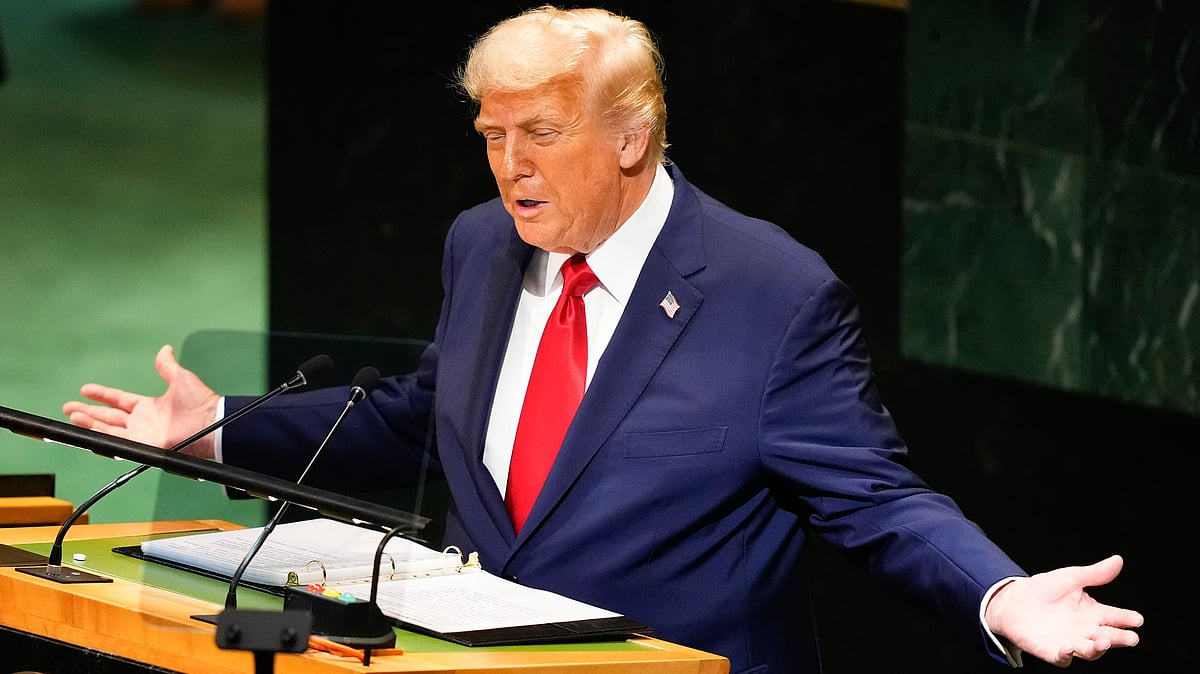World
BBC apologises to Trump for misleading edit, rejects $1 billion defamation claim
Trump’s legal team demands an apology and a “full, fair retraction” of the documentary and any “false or misleading” statements about him

In a dramatic turn in an already fraught trans-Atlantic dispute, the BBC on Thursday, 13 November, issued a formal apology to US President Donald Trump for a misleading edit of his 6 January 2021 speech — an edit that the broadcaster now concedes created an unintended and damaging impression.
Yet, even as it bowed its head in regret, the BBC firmly rejected the foundation of Trump’s staggering $1 billion lawsuit threat, declaring that it had not defamed him.
The apology, delivered in a personal letter from BBC chair Samir Shah to the White House, expressed remorse for the way the documentary had stitched together distant portions of Trump’s speech — delivered nearly an hour apart—into what appeared to be a continuous call to action as Congress prepared to certify Joe Biden’s 2020 election victory. Some of Trump’s supporters later stormed the US Capitol, casting a long, dark shadow over that day and over the years that followed.
The BBC confirmed it has no plans to rebroadcast the documentary, acknowledging that the editing gave viewers the false impression that Trump had issued a direct incitement to violence.
Published: undefined
“We accept that our edit unintentionally created the impression that we were showing a single continuous section of the speech… and that this gave the mistaken impression that President Trump had made a direct call for violent action,” the broadcaster wrote in its retraction.
The controversy erupted after Trump’s lawyer sent a sharply worded legal notice demanding an apology and threatening a $1-billion lawsuit if the broadcaster did not comply by Friday — claiming the documentary caused the president “overwhelming financial and reputational harm.” The edition of Panorama at the centre of the storm — “Trump: A Second Chance?”—aired days before the 2024 U.S. presidential election.
The film, produced by a third-party company, had spliced together three lines from two widely separated segments of Trump’s 2021 speech. It created the appearance of a single fiery exhortation urging supporters to march with him and “fight like hell,” omitting the intervening segment where Trump called for peaceful demonstration.
The scandal took down BBC leadership. On Sunday, 9 November, director-general Tim Davie and news chief Deborah Turness resigned, saying the error had inflicted deep damage on the broadcaster’s credibility. “As the CEO of BBC News and Current Affairs, the buck stops with me,” Davie wrote in his departure note.
Published: undefined
Trump’s legal team demanded not only an apology but a “full and fair retraction” of the documentary and of any “false, defamatory, disparaging, misleading or inflammatory” statements about the president.
Experts, however, noted that Trump would face steep legal hurdles:
Defamation deadlines in English courts expired more than a year ago.
Damages under English law rarely exceed £100,000 ($132,000).
Because the documentary never aired in the United States, Trump would struggle to prove that American audiences thought less of him due to a programme they could not watch.
Even so, some analysts suggested Trump might use the controversy as pressure for a settlement.
The apology also comes amid fresh turbulence within the BBC. The corporation is investigating a Daily Telegraph report that its Newsnight programme in 2022 similarly spliced parts of Trump’s Jan. 6 remarks.
And if the matter were ever to reach a courtroom, legal experts noted that the BBC could point to one unassailable fact: Donald Trump went on to win the 2024 US presidential election, undercutting any claim that he had suffered lasting harm to his reputation.
In the end, the corporation’s apology reads as both contrition and defiance—an attempt to close a painful chapter even as it resists being cast as the villain in a saga still charged with political electricity on both sides of the Atlantic.
With agency inputs
Published: undefined
Follow us on: Facebook, Twitter, Google News, Instagram
Join our official telegram channel (@nationalherald) and stay updated with the latest headlines
Published: undefined